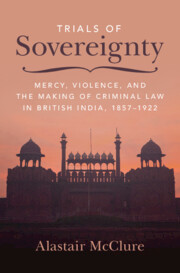Book contents
- Trials of Sovereignty
- Studies in Legal History
- Trials of Sovereignty
- Copyright page
- Dedication
- Contents
- Figures and Table
- Acknowledgments
- Abbreviations
- Introduction
- 1 Forgetting War and Punishing Crime
- 2 The Peace: The Queen’s Proclamation and the Politics of Forgiveness
- 3 The Code: Judges, Juries, and Punishing Difference
- 4 Discretion, the Death Penalty, and the Criminal Trial
- 5 Pardons and Scaffolds
- 6 Tilak’s Radical Innocence: Mercy, Sedition, and the State Trial
- 7 Gandhi’s Guilt and the Return of War
- Conclusion
- Epilogue
- Select Bibliography
- Index
- Studies in Legal History
Epilogue
Published online by Cambridge University Press: 20 November 2024
- Trials of Sovereignty
- Studies in Legal History
- Trials of Sovereignty
- Copyright page
- Dedication
- Contents
- Figures and Table
- Acknowledgments
- Abbreviations
- Introduction
- 1 Forgetting War and Punishing Crime
- 2 The Peace: The Queen’s Proclamation and the Politics of Forgiveness
- 3 The Code: Judges, Juries, and Punishing Difference
- 4 Discretion, the Death Penalty, and the Criminal Trial
- 5 Pardons and Scaffolds
- 6 Tilak’s Radical Innocence: Mercy, Sedition, and the State Trial
- 7 Gandhi’s Guilt and the Return of War
- Conclusion
- Epilogue
- Select Bibliography
- Index
- Studies in Legal History
Summary
In November 1945, the colonial government placed three Indian soldiers on trial for the crimes of waging war against the British Empire, murder, and abetment to murder. In what ultimately proved a foolhardy decision, the colonial administration decided to hold the trial in the historic Red Fort in Delhi, the site from where this book began. While the trial was intended to solidify military discipline and consolidate British legitimacy in India, the affair escalated into a major crisis of colonial authority. As the controversy around the trial grew, mercy once again emerged as a key terrain of political contestation in the final days of empire.
- Type
- Chapter
- Information
- Trials of SovereigntyMercy, Violence, and the Making of Criminal Law in British India, 1857–1922, pp. 328 - 334Publisher: Cambridge University PressPrint publication year: 2024

